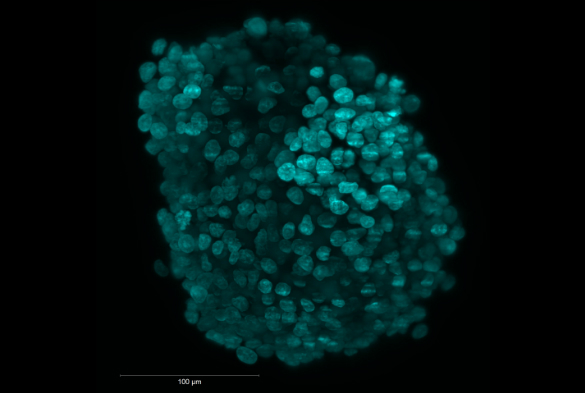
An innovative research network led by the University of Liverpool has secured funding as part of a new £3 million joint technology initiative announced today.
3DBioNet brings together academic and industry experts from different disciplines to examine cells growing in three dimensions.
Scientists have traditionally grown cells on flat surfaces but these are not representative of their natural state in the body. Despite the barriers to overcome, this field has huge potential for discovering new medicines, re-purposing old ones and developing a more personalised approach to medicine.
Project lead Dr Raphael Lévy, from the University’s Institute of Integrative Biology, said: “Just like going from 2D printing to 3D printing requires new materials, new software, new ideas and new procedures, going from 2D cell culture to 3D cell culture requires a large number of innovations in the methods, materials and technologies that scientists use to design, perform, analyse and interpret their experiments.
“The purpose of the 3DbioNet network is to bring together the skills of scientists from many different disciplines within academia and industry needed to identify the stumbling blocks and help building this new way of doing biology.”
“We have been really impressed by the enthusiasm from both industrial partners and academia for 3DbioNet with over 80 members signed up even before it had been funded. It is an area with promising applications and scientific challenges which require interdisciplinary collaborations.”
With this new funding, 3DBionet will use scientific meetings, social networks and pump priming projects to generate collaborations and accelerate progress in the development of 3D cell culture and microtissues.
Technology Touching Life is a joint initiative between the Medical Research Council (MRC), Biotechnology and Biological Sciences Research Council (BBSRC) and the Engineering and Physical Sciences Research Council (EPSRC), all part of UK Research and Innovation.
Five research networks, awarded £3 million through the initiative, will harness new and emerging developments from the engineering and physical sciences to advance life sciences discovery research.
Dr Nathan Richardson, Head of Molecular and Cellular Medicine at the MRC, said: “The development and application of innovative technologies is crucial to furthering our knowledge and understanding across the biomedical sciences. These Technology Touching Life networks offer an exciting opportunity to bring researchers together, across a number of disciplines, to explore the tools and technologies of the future, with impacts ranging from how we grow cells to better mimic the human body, to following dynamic changes in cells and tissue.”
3DBioNet is co-directed by Dr Raphaël Lévy and Professor Helen Byrne at the University of Oxford’s Mathematical Institute.
Learn more about 3DBioNet
Website: https://3dbionet.wordpress.com
Twitter: @3DbioNet